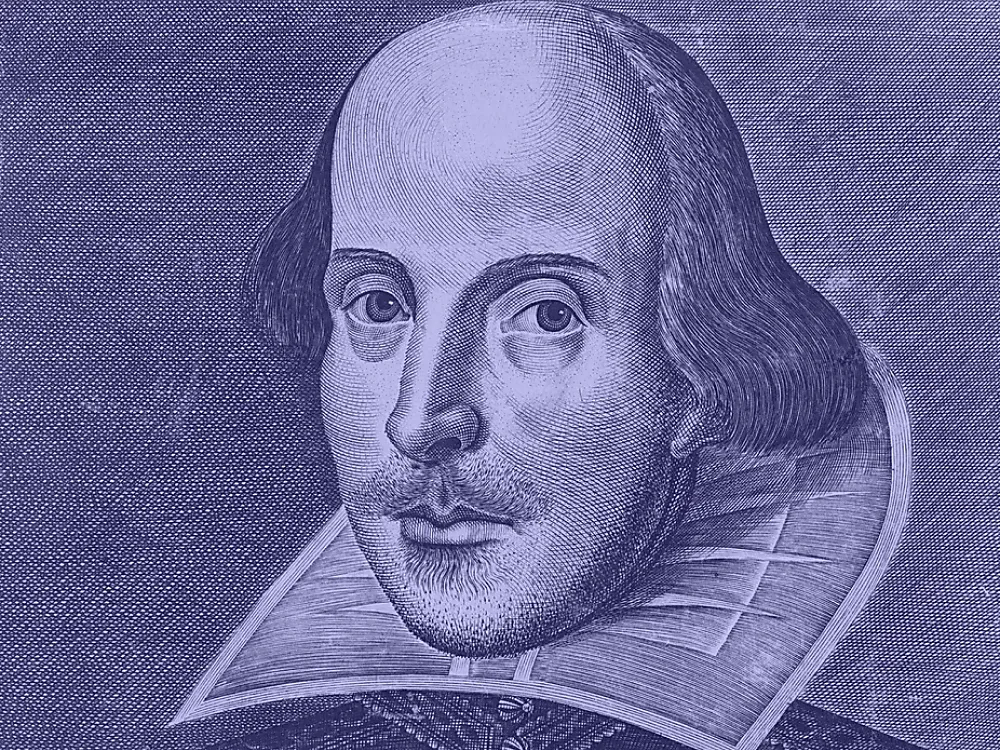Table of contents
If you Google “How many words did Shakespeare invent”, you’ll probably see a number around 1,700.

There is no doubt that Shakespeare was a hugely influential person on the English language, and we are all still using many of the words that he is believed to have brought into common usage today.
Many of these words are now obscure, and if you used one in conversation you would probably be met with a confused look.
But there are hundreds that you probably know and use already.
Indeed, by simply using English you are using words that Shakespeare either invented, was the first person to use in print, or is at least credited for (keep on reading for a more detailed discussion of this).
Here are a selection of some of his most famous gifts to the English language.
Alligator: (n) a large, carnivorous reptile closely related to the crocodile
Romeo and Juliet, Act 5 Scene 1
Bandit: (n) a robber or outlaw belonging to a gang and typically operating in an isolated or lawless area.
Henry VI, Part 2, Act IV, Scene I
Bedroom: (n) a room for sleeping; furnished with a bed
A Midsummer Night's Dream, Act 2 Scene 2
Critic: (n) one who judges merit or expresses a reasoned opinion
Love's Labour's Lost, Act 3 Scene 1
Downstairs: (adv) on a lower floor; down the steps
Henry IV Part 1, Act 2 Scene 4
Eyeball: (n) the round part of the eye; organ for vision
Henry VI Part 1, Act 4 Scene 7
Fashionable: (adj) stylish; characteristic of a particular period
Troilus and Cressida, Act 3 Scene 3
Gossip: (v) to talk casually, usually about others
The Comedy of Errors, Act 5 Scene 1
Hurry: (v) to act or move quickly
The Comedy of Errors, Act 5 Scene 1
Inaudible: (adj) not heard; unable to be heard
All's Well That Ends Well, Act 5 Scene 3
Jaded: (adj) worn out; bored or past feeling
Henry VI Part 2, Act 4 Scene 1
Kissing: (ppl adj) touching with the lips; exchanging kisses
Love's Labour's Lost, Act 5 Scene 2
Lonely: (adj) feeling sad due to lack of companionship
Coriolanus, Act 4 Scene 1
Manager: (n) one who controls or administers; person in charge
Love's Labour's Lost, Act 1 Scene 2
Nervy: (adj) sinewy or strong; bold; easily agitated
Coriolanus, Act 2 Scene 1
Obscene: (adj) repulsive or disgusting; offensive to one's morality
Love's Labour's Lost, Act 1 Scene 1
Puppy dog: (n) a young, domestic dog
King John, Act 2 Scene 1
Questioning: (n) the act of inquiring or interrogating
As You Like It, Act 5 Scene 4
Rant: (v) to speak at length in inflated or extravagant language
Hamlet, Act 5 Scene 1
Skim milk: (n) milk with its cream removed
Henry IV Part 1, Act 2 Scene 3
Swagger: (v) walk or behave in a very confident and arrogant or self-important way
A Midsummer Night's Dream, Act III, Scene I
Traditional: (adj) conventional; long-established, bound by tradition
Richard III, Act 3 Scene 1
Undress: (v) to remove clothes or other covering
The Taming of the Shrew, Induction Scene 2
Varied: (adj) incorporating different types or kinds; diverse
Titus Andronicus, Act 3 Scene 1
Worthless: (adj) having no value or merit; contemptible
The Two Gentlemen of Verona, Act 4 Scene 2
Xantippe: (n) shrewish wife of Socrates; figuratively, a bad-tempered woman
The Taming of the Shrew, Act 1 Scene 2
Yelping: (adj) uttering sharp, high-pitched cries
Henry VI Part 1, Act 4 Scene 2
Zany: (n) clown's assistant; performer who mimics another's antics
Love's Labour's Lost, Act 5 Scene 2
There is even a cult poster from the journalist Bernard Levin with a selection of words or phrases that he believed were invented by Shakespeare.
All of the highlighted words are suggested to have been Shakespeare’s inventions.

But did he really invent all of these words out of thin air? If he did, how would we actually know? He was a prolific writer, and even if he was the first to record these phrases, he could have just heard them elsewhere.
For a further exploration of this topic I’d recommend this excellent article from Stephen Winick at the Library of Congress, but there really is no way to know.
Shakespeare enthusiasts can debate all day long about the probability that a certain word was invented completely by William Shakespeare, but there is little debate that few people since have had the talent for using language to convey meaning.
And for that, we must certainly be thankful to William Shakespeare.
Further listening
Episode 162: The Genius of William Shakespeare
Sources
Proverbs, Myths, and “The Bard”: Are We Really “Quoting Shakespeare”?




![10 Activities to Improve Your English Speaking [Self-Study Guide #4]](https://cdn.prod.website-files.com/5d70d85d6d5a384776dc97e4/681a06c8cfb71e8e1d88dd78_636d1518a62e061308afdc31.webp)